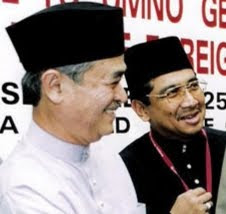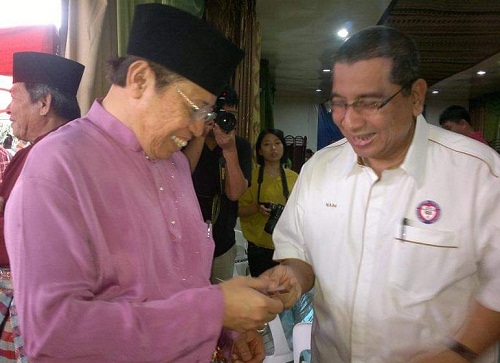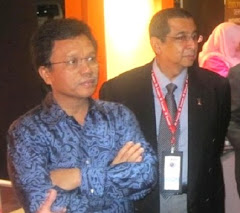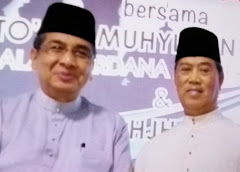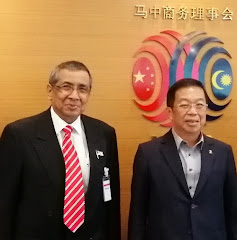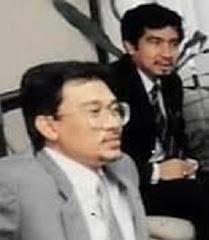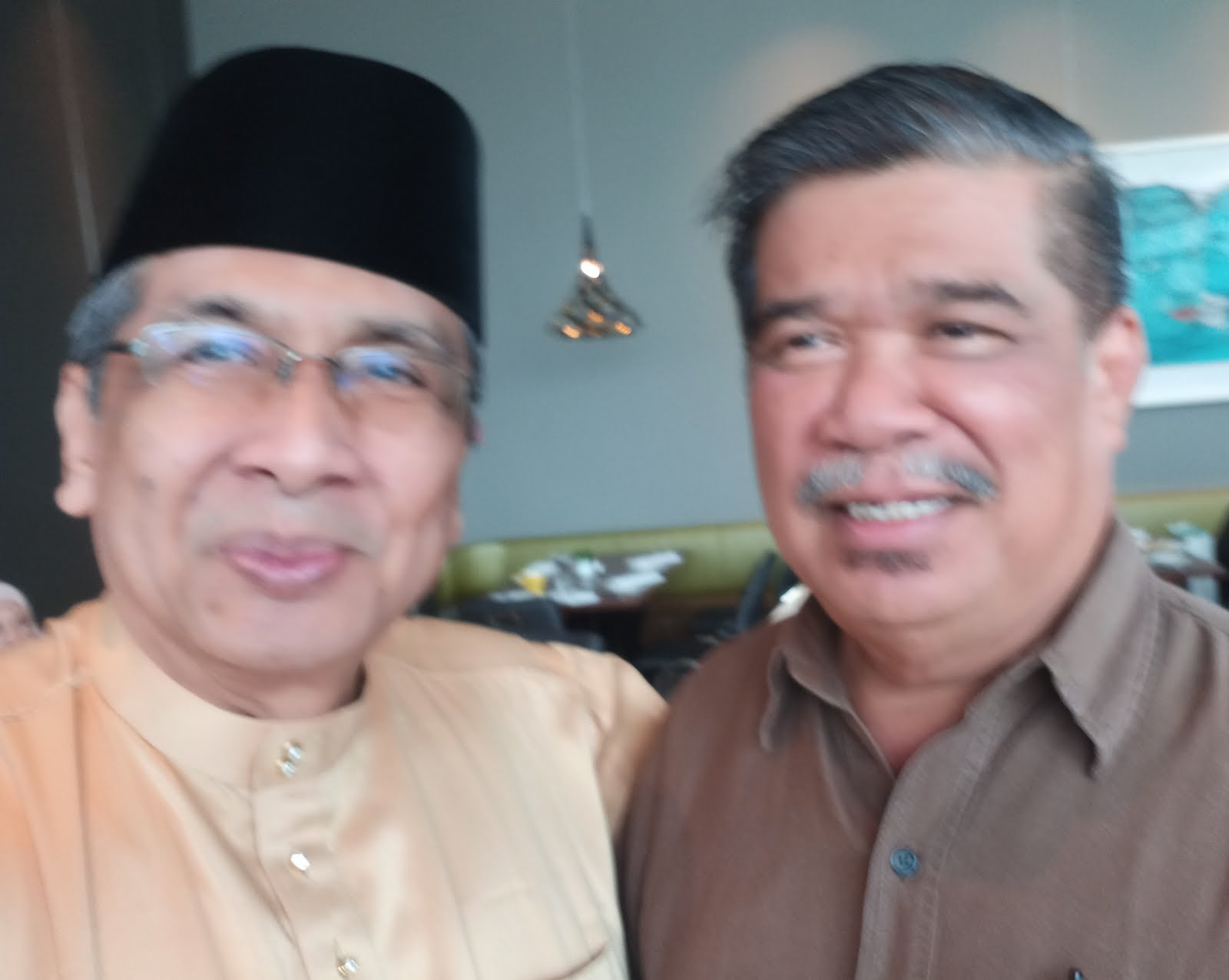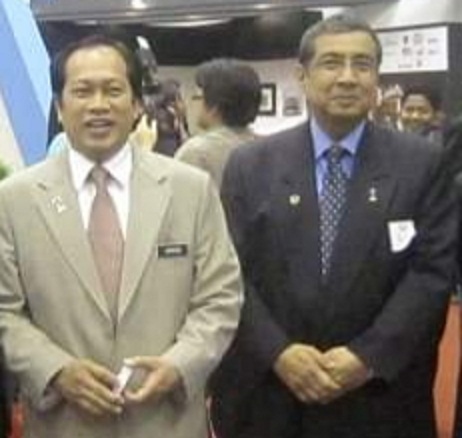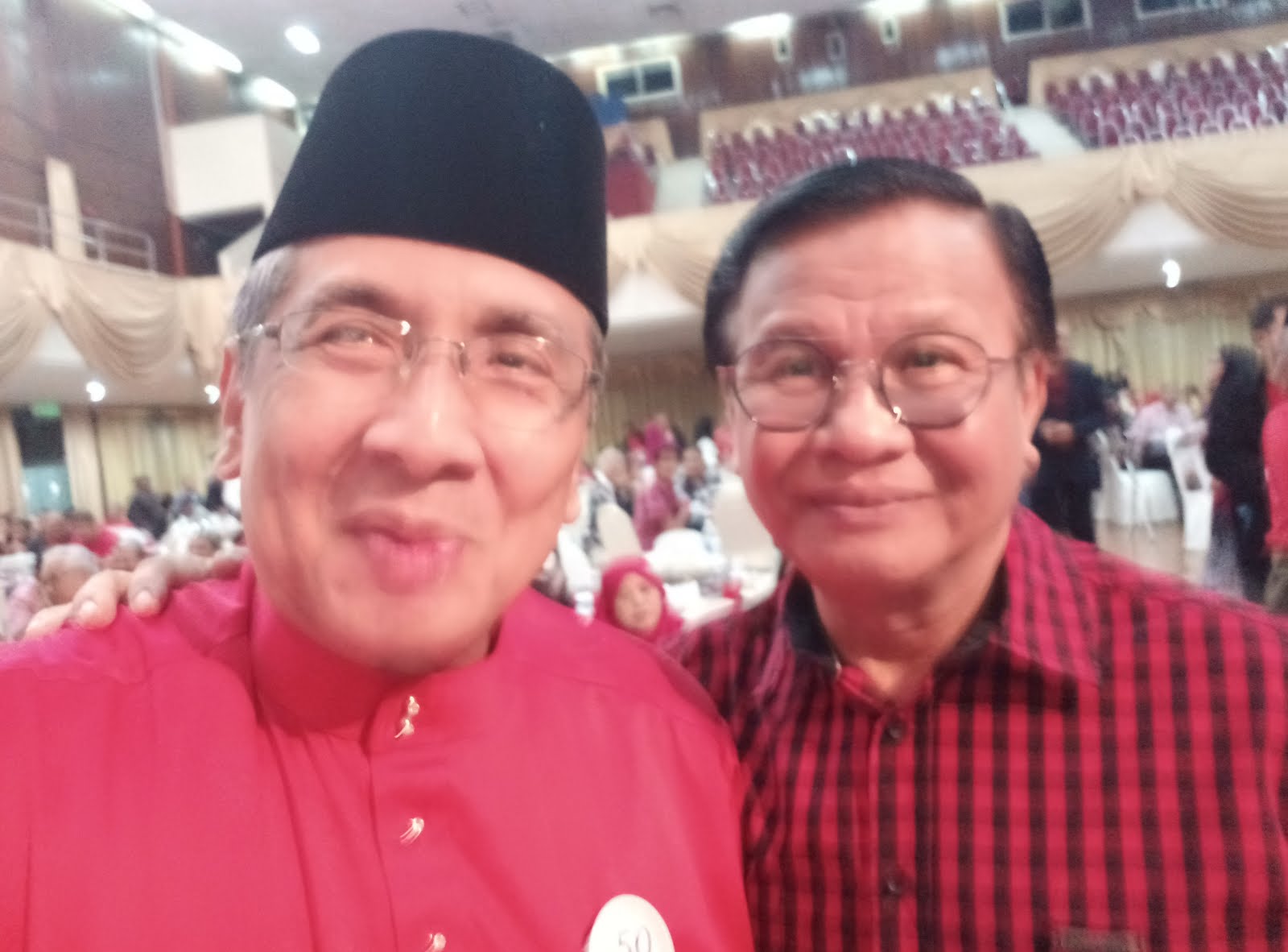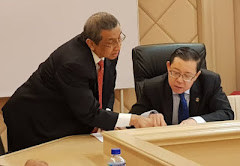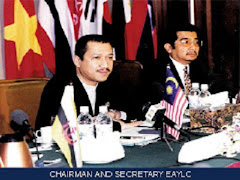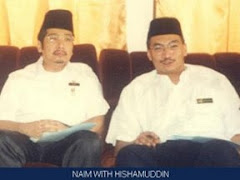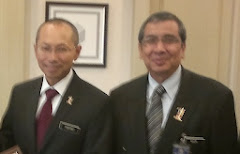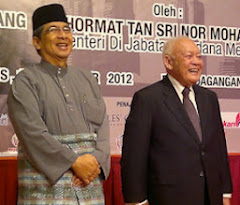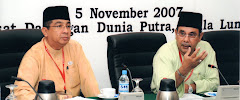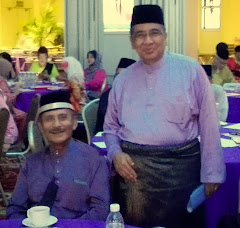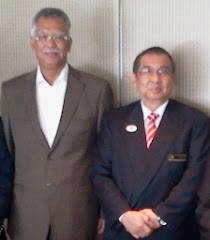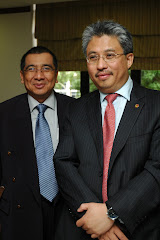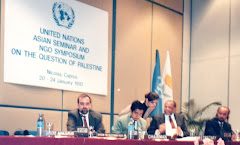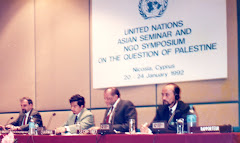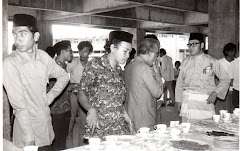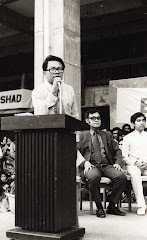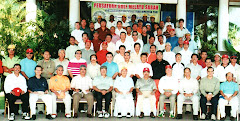Faced with a RM589 million suit by Danaharta, one-time corporate high-flyer Tan Sri Tajudin Ramli has counter sued for RM13.46 billion and also drops the following bombshell in court documents:
* He was directed by former prime minister Tun Dr Mahathir Mohamad and former finance minister Tun Daim Zainuddin to buy shares in MAS to help Bank Negara recover from foreign exchange losses in 1994
* The transaction was a national service but was disguised as an arm's length commercial deal because the government wanted it that way
* He was at all times only a nominee/agent of the government in MAS
* He was assured repeatedly by Mahathir and Daim that he would not suffer any losses or be held liable for anything arising from his purchase of the MAS shares.
PETALING JAYA: Tan Sri Tajudin Ramli, who was sued by Danaharta recently for RM589 million, has filed a countersuit against Danaharta, the Malaysian Government and several other companies and individuals for a total sum of about RM13 billion.
The suit revolved around transactions related to shares of Malaysia Airlines Bhd (MAS), Celcom (M) Bhd and Naluri Bhd, all companies that Tajudin had controlled at one time.
In court documents filed by his lawyers Lim Kian Leong & Co on June 29, 2006, Tajudin made some startling revelations about the circumstances leading to his RM1.8 billion acquisition of a 32% stake in MAS in 1994.
He claimed that it was not a normal commercial deal as it was made out to be and that he was instructed by Tun Dr Mahathir Mohamad and Tun Daim Zainuddin to buy MAS shares at RM8.00 each (way above the then market price of RM3.50) as a national service to help out Bank Negara (which owned the MAS shares) which was hit by multi-billion ringgit foreign exchange losses.
Tajudin said his purchase of MAS shares was disguised as a commercial deal as "it was essential for the public and the international investment community to perceive the entire transaction as a normal commercial arms length deal (which clearly it was not)".
The one-time corporate high-flyer said he did not want to buy the MAS stake as he was worried about financial losses but agreed to do it because it was a directive and also because the government had assured him that he would be protected from financial losses and liabilities.
Tajudin said at all time, he was a nominee of the government of Malaysia (GOM) and that there was an "Overriding Agreement" pertaining to the whole exercise.
He went on to say that he was requested from the start never to reveal this arrangement and had honoured it because there were repeated assurances from Mahathir and Daim that he would be protected from any financial losses and liabilities.
He described Danaharta's legal action against him as a "clear breach of the Overriding Agreement by the GOM" and he now had no choice but to reveal what he claimed to be the truth.
In his statement of claim, Tajudin said as a result of the 1998 financial crisis, Danaharta took over his non-performing loans from the bank together with the shares and securities that he had pledged.
At the request of the GOM, he cooperated with Danaharta to settle the problem on the understanding that that GOM would abide by the Overriding Agreement and that a fair mechanism would be reached to relieve Tajudin of all liabilities arising from his purchase of MAS shares.
Tajudin obtained confirmation from Daim before entering into a "settlement agreement" with Danaharta that it was necessary for "appearances"and that the Overriding Agreement would still be honoured.
The court documents went on to explain how in the end the whole negotiations collapsed causing him to lose control of Naluri.
He then alleged that this was part of a conspiracy by Danaharta to sell his shares in Technology Resources Industries Bhd (TRI) to Telekom Malaysia cheaply and enable Telekom to merge TRI's subsidiary Celcom with Telekom Malaysia's own cellular telecommunications business.
Following are the summaries of the key points with regards to the so-called Overriding Agreement Tajudin had with the GOM contained in his 104-page court document.
Since the mid-80s, the Government of Malaysia (GOM) had embarked on a wide-ranging privatisation programme which included major infrastructure development, utilities, strategic industries and other key areas being privatised. The policy was termed generally as "Malaysia Inc.". A key feature of "Malaysia Inc." was the close symbiotic relationship between the GOM and private entrepreneurs.
Whilst termed "private", many of these private entrepreneurs, including Tajudin, were in fact, required and obliged to carry out activities and business on behalf of the GOM as a matter of National Service or Duty:
MAS's performance during the 1980s and early 1990s was not reflective of the dynamic economic upswing experienced by Malaysia.
The GOM, being very concerned with MAS, had considered ways to deal with it, including the disposal of government held shares in MAS (through Bank Negara Malaysia) and privatisation.
Due to the special nature of MAS, as a national carrier with wide-ranging social and political responsibilities, it was not suitable to be privatised in the conventional manner.
However, in the early 1990s, it was well known that Bank Negara Malaysia, which was holding the shares in MAS on behalf of GOM, had suffered massive foreign exchange losses due amongst other causes, to imprudent speculation in the foreign currency markets.
Even though MAS was not a conventional privatisation candidate, the GOM investment in MAS had to be disposed of to cover these foreign exchange losses and so as to make this politically acceptable, the terminology of privatisation was used to disguise the real motive, which was to cover the Bank Negara Malaysia losses.
Initially, 10% was sold in June 1992, reducing the GOM's investment in MAS to 32%. The GOM urgently had to sell the balance of the shares in MAS to meet the foreign exchange losses incurred by Bank Negara Malaysia in 1994 by way of a "privatisation exercise".
When the GOM decided to "privatise" MAS, the GOM wanted an established Bumiputra to take over its equity stake. The GOM, through Mahathir, raised the possibility of Tajudin taking over MAS on behalf of the GOM since Tajudin was already involved in the transportation business through Naluri Bhd ("Naluri") (formerly known as Malaysian Helicopter Service Bhd).
At the suggestion of the GOM, Tajudin considered the proposal to take over MAS. Tajudin could not afford to buy the shares personally or through his private companies. He could only consider taking over the 32% shares in MAS from Bank Negara Malaysia through Naluri.
However, Tajudin was extremely reluctant, as the task to purchase and carry out the radical restructuring required for MAS was beyond that of an ordinary private entrepreneur. Tajudin was concerned the task might bring his other businesses to ruin.
However, the then Prime Minister made it very clear to Tajudin that this task was to be a National Service and was in fact an obligation. It was also emphasised to Tajudin that the Malaysian economy was facing extremely difficult times brought about inter alia by foreign currency speculations by Bank Negara Malaysia and that purchasing the GOM's shares in MAS was considered to be essential by the GOM to avert the national emergency.
Based on conventional financial wisdom, Tajudin was only prepared to acquire Bank Negara Malaysia's interest in MAS at no more than RM5 per share which even then represented a premium of more than 40% over the market price which then was around RM3.50 per share.
Mahathir, through Tun Daim Zainuddin, on behalf of the GOM, instructed Tajudin to pay RM8 per share for the shares in MAS. The GOM required this price to assist it to avert the foreign exchange crisis. The price had nothing to do with the economic or true value of the MAS shares.
However, Tajudin was not prepared to proceed with the transaction without protection as there was no way commercially for Tajudin ever to recoup an investment at RM8 per share or to pay normal commercial financing costs.
When Tajudin expressed his unwillingness to purchase the shares in MAS at RM8 per share, Tajudin was requested by Tun Daim not to refuse the then Prime Minister. After further discussions and considering that it was a National Service and public duty entrusted to him and to avert national crisis, Tajudin had no choice but to agree to proceed with the transaction.
However, Tajudin's agreement was subject to and conditional on the Overriding Agreement on the understanding that Tajudin was to act as the agent and/or the servant of the GOM.
Tajudin wished for the acquisition to be carried out by Naluri, as initially discussed, but the then Prime Minister and the GOM insisted that the sale should be carried out quickly as the cash proceeds were immediately and urgently necessary to offset the massive foreign exchange losses incurred by Bank Negara.
Due to the GOM's insistence, Tajudin agreed to the GOM's request to expedite the purchase and that he personally or through his private company would take over the shares in MAS from Bank Negara on the understanding that Tajudin would later "on-sell" them to Naluri.
The GOM insisted on this method even though it was clearly understood that Tajudin did not have the financial capability.
The acquisition through private means was necessary to avoid the need for time consuming approvals which Naluri (being a public listed company) would have been required to obtain. Tajudin therefore had no choice but to agree to the GOM's requirements as to price at RM8 per share and method and speed. However, Tajudin's agreement was always subject to and conditional upon the Overriding Agreement.
The urgency imposed by the GOM required Tajudin to take out personal loans and giving personal assets/securities as collateral, which Tajudin would not otherwise have had to give if Naluri had been the original purchaser.
The loans taken were advanced to Tajudin's private company, RZ Equities Sdn Bhd. As security for the syndicated loan, Tajudin pledged most of his shares in Naluri and TRI and his other interests to the lenders.
The GOM, through Ministry of Finance ("MOF"), Bank Negara Malaysia and other regulatory bodies, arranged for the transaction to be concluded expeditiously with stamp duty waiver, single customer limit waiver and various immediate approvals, etc. This was all to enable Bank Negara to obtain the sale proceeds to offset its foreign exchange losses and to fulfill the GOM's requirement.
Prior to agreeing to the purchase, Tajudin was convinced and assured by the then Prime Minister and Tajudin agreed that this was not to be a "takeover" in the traditional sense.
It was important for political and commercial reasons (including for foreign investment perception) and also in the National Interest that Tajudin was to be perceived as "taking over" the shares in MAS from Bank Negara through normal commercial share sale procedures and financing.
But the actual agreement between Tajudin and the GOM was different. Prior to entering into the transaction, it was agreed and understood between Tajudin, the then Prime Minister and the GOM that the acquisition would be subject to and conditional upon the Overriding Agreement.
Further, as part of the Overriding Agreement, after the immediate financial crisis at Bank Negara had been averted, Tajudin would be permitted to sell back the MAS shares to the GOM and be relieved and indemnified in respect of all liabilities which may have been incurred as a result of the initial purchase.
Tajudin was also assured by the then Prime Minister that he would not "lose out".
This was explained to Tajudin that if at the end of the day the task turned out to be "too big", the GOM would buy back the MAS shares and work out an arrangement in such a way that all Tajudin's financial obligations would be settled so that Tajudin could "return to status quo", i.e. with no liabilities in respect of any matter connected with or arising from or related to the purchase of the MAS shares from Bank Negara by Tajudin or companies connected to Tajudin.
Thus it was an express term of the Overriding Agreement that Tajudin would be indemnified by the GOM against all such liability aforesaid. It was only on express assurance from the then Prime Minister and the GOM and subject to the Overriding Agreement that Tajudin agreed to proceed with the purchase of the 32% shareholding in MAS from Bank Negara and enter into "commercial" and financial arrangements.
In keeping with the spirit and image of "Malaysia Inc.", it was essential for the public and the international investment community to perceive the entire transaction as a normal commercial arms length deal (which clearly it was not) and Tajudin was requested and until the filing of this Defence and Counterclaim has kept silent to maintain this image.
However, due to the position taken by Danaharta to sue him and the clear breach of the Overriding Agreement by the GOM, Tajudin has no choice now but to reveal the true Overriding Agreement.
Further, as part of the Overriding Agreement, as between the GOM and Tajudin, Tajudin was required to carry out the Public Duty in the National Interest and as part of his "National Service" to take on the task of heading MAS on behalf of the GOM.
To further emphasise the special nature of the Overriding Agreement, Tajudin was appointed, and at all times remained on the board of MAS as a nominee, servant and agent of the GOM, and not in his own right or as Naluri's nominee.
Due to the sensitive nature of the Overriding Agreement, Tajudin did not seek any written confirmation from Mahathir or Daim on behalf of the GOM. Tajudin had never known the then Prime Minister and the GOM to renege on any agreement before and had complete trust in the principle "my word is my bond". However, it should be noted that the GOM at all times maintained a "Special Share" or "Golden Share" in MAS, in recognition of the GOM's special rights and in recognition that Tajudin was acting as a Government nominee.
Throughout his tenure as a director and chairman of MAS, in keeping with his special role as GOM nominee, servant and agent, Tajudin was not allowed to manage MAS according to normal commercial terms but at all times reported to and abided by the decisions of the GOM on material matters, including but not limited to matters concerning the re-branding, livery, disposal of assets, restructure of human resources, policies involving domestic and international routes, passenger and cargo hubs, investments, etc.
Tajudin briefed and obtained the support of the then Prime Minister, cabinet and the GOM on all material issues before implementation and was not permitted to implement matters which were rejected by the GOM. Further, Tajudin also undertook not to sell any of the shares in MAS on the open market even if the share price was very high. This was because MAS was the "national carrier" and the airline was and still is one of the nation's strategic industries.
REPURCHASE OF MAS SHARES BY GOM
Following the Asian economic crisis of 1997/98, MAS performance was severely affected. At the same time, MAS critically required more capital injection to meet the loan obligations and working capital caused by the depreciation of Ringgit.
The loans taken by MAS were in foreign currencies (mainly US Dollars and Japanese Yen) as MAS was not allowed due to GOM restrictions to borrow in the Malaysian financial market. MAS's foreign currency loans were particularly onerous.
The GOM did not permit MAS to borrow in the domestic Ringgit market as MAS's capital requirements were such that local banks did not have sufficient resources to lend to MAS without causing a shortage of funds to other Malaysian borrowers.
The GOM therefore insisted that MAS should only borrow from foreign lenders and hence, MAS was particularly hard hit by the depreciation of Malaysian Ringgit at this time.
A substantial portion of the foreign currency debt had been incurred by MAS before Tajudin bought the 32% stake.
Neither Tajudin nor Naluri had sufficient resources to meet MAS's capital requirement. To address the said problem and after discussions with the GOM, and in accordance with the Overriding Agreement, the GOM agreed to repurchase the shares in MAS from Tajudin at RM8 per share.
The monies were paid to Naluri which by then had acquired the MAS shares as originally planned by Tajudin and the GOM.
It was also understood that Tajudin would be relieved of all personal liabilities and indemnified in accordance with the Overriding Agreement but the details were to be left to the bankers and corporate advisers to work out.
Negotiations to transact the aforesaid in accordance with the Overriding Agreement were handled by various parties, including Mahathir and Daim Zainuddin, personally and Tajudin understood that such negotiations were with the support and knowledge of the Cabinet.
Around this time, Tajudin had also been requested by the GOM together with other corporate leaders, to support the stock market and this required Tajudin and companies related and associated with him to invest substantial amounts which would otherwise have been used for their usual businesses.
This is another example of public service which imposed a heavy burden on Tajudin. Mahathir, Daim and the GOM and Tajudin received a huge amount of public criticism at the time, including from foreign commentators who were highly critical of GOM policies but Tajudin was requested at the time as a matter of national interest not to disclose the truth concerning the Overriding Agreement for the time being.
In accordance with the Overriding Agreement, the monies paid to Naluri for the shares in MAS were actually intended to discharge Tajudin's liabilities for the loans taken out to buy the shares in MAS and to constitute a full and final settlement of Tajudin's liabilities and it was agreed that details and exact arrangements were to be worked out by bankers and corporate advisers and Tajudin would be indemnified accordingly.
In hindsight, it is apparent from the events following the repurchase of the shares by the GOM, despite the periodic assurances of the then Prime Minister, that the GOM has by itself and through its servants and agents, including Danaharta and the Special Administrators consistently failed to honour and have indeed breached the Overriding Agreement on several occasions.
















